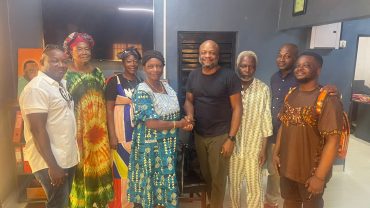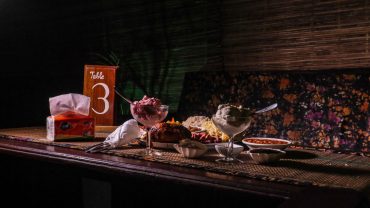All over sub Saharan Africa from East to West, mini buses have a special name. In Kenya it is Matatu, in Nigeria – Danfor, Ghana – Tro-tro, Guinea – Magbana and in Sierra Leone – Poda poda.
These are public minibuses which ordinarily are just modes of transportation, but interestingly they are dynamic modes of cultural meaning. The drivers adorn the vehicles with popular cultural expressions in a range of forms, from idolizing their favourite music stars like Madonna, to religious sayings “God is great”, to icons from popular English Premier Teams like Arsenal and Chelsea, to classic American icons like Winnie the Pooh, to political messages about capitalism and corruption.
These symbols of popular culture represent linkages to a number of cultural fields, including music, materialism, globalization, history, colonialism, identity, class, economy, media and technology.
At a popular stop for Poda podas on Campbell Street in the centre of Freetown, vehicles passed by with different messages. The most popular were religious sayings – Muslim or Christian – which one could argue reflects the country’s extreme religious tolerance. Asked about his decision to put “Allah is great” on the front of his minibus, Alieu Sesay, a poda poda driver, said, “I believe in Allah and he will protect me and my poda poda. I will make good business.”
Mohamed Gibril, a taxi driver, had a large Union Jack on the front of his taxi. When asked what motivated him, he said, “I like the British – they mean quality. I want my customers to think that I will offer quality service too.”
The next Poda poda that stopped at St. John Roundabout was covered with 50
Cent, the popular American hip hop artist. The driver, Tamba Lebbie, said, “I love 50 cent and I love hip hop music.”
One taxi had a large Nike symbol from the popular American sportswear brand on its back window. It was painted in “African” colours, red, green and yellow. The taxi driver, Sampha Koroma, said, “I like Nike shoes. I painted the symbol in those colours to make it more African.”
The fun of it all is not just shared by the drivers, passengers and pedestrians too take notice and enjoy the displays.
Asked about the decorated vehicles. Alice Kamara, who had just come down from a taxi with a rubber dinosaur glued to its roof, chuckled and said, “It is entertaining to see how the vehicles are decorated. It makes me laugh.”
Another passenger, Susan Cole, when asked if a message would influence her decision to go inside the vehicle said, “I notice the message but I would not choose to go inside the car, if I didn’t agree with the message. I am Christian and I just got out of that taxi that says ‘Allah is great’. It doesn’t make a difference to me. There is only one God and we are all Sierra Leoneans.”
That is religious tolerance at its best in this small cosmopolitan city. But the commentary on the Poda podas is not all about religion.
Globalization has resulted in increased access to Western culture in Sierra Leone. This is reflected in music, Hollywood films, the Internet and mass media such as the BBC and CNN. It is evident that the emergence of Western consumer and material culture has also influenced the social constructs of Sierra Leoneans. In some cases, this has led to an ‘idealization’ of the west. When one driver was asked why his car was adorned in American flags, he said, “I love everything about America and I want to go there someday.”
Despite the overbearing influence of western culture the national culture is also visible and meaningful. Some slogans are in Krio, the country’s lingua franca, a common language that unites the 17 different ethnic tribes. “Done dem all” was painted on one taxi, which literally translated means “I have surpassed all of them”.
Motivational messages are also popular. In a country that has faced a lot of challenges, messages such as “Never Discourage” and “Respect thy neighbour” are commonplace.
Historic influences come into play drawing comments linked with the Country’s colonial past. Some vehicles showcase the Union Jack or even state “God bless the queen”.
Indeed, known all around Africa for recklessness, the drivers also post cautionary
messages like “Respect the Police.”
A visitor from Denmark was asked about her impression of the decorated vehicles. She lauded Sierra Leoneans free expression of culture and said that she was motivated to decorate her car when she returned home.
The decorated messages on transportation vehicles in Sierra Leone give an insight into the vibrant culture and the fun loving nature of Sierra Leoneans. Even the medium of choice to showcase these messages represents values of creativity and freedom of expression. In a continent where freedom of expression is sometimes not lauded, do Sierra Leoneans take for granted that they can freely express their socio- political and cultural views without being judged? This is something to celebrate about Sierra Leonean culture.
Photos by Signe Juul Clevin




Comment (0)